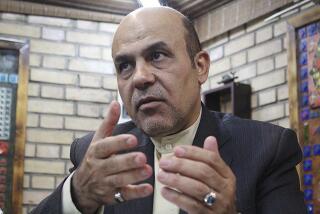Execution in Iraq
- Share via
In the weeks since the execution of Farzad Bazoft as a spy, there has been a continuing flow of intemperate and ill-formed attacks on my government, including Jonathan Power’s column (Op-Ed Page, March 26), for having carried out the execution. These commentaries all proceed from the premise that Bazoft--despite his conviction--was not a spy. I would now like to address this central issue.
Even the harshest critics of my government’s action concede some basic facts: Bazoft entered a restricted military area south of Baghdad after an accidental explosion there, with the help of a British nurse, who drove him in an Iraqi government hospital vehicle where she was working, assuming the guise of an Indian doctor. He took soil samples and made photographs and drawings of the area. He performed these activities while in Iraq at an invitation of the government to cover the elections in the Kurdish Autonomous Region in northern Iraq, along with other foreign journalists, on behalf of the British Observer newspaper. Iraq’s critics assert that this was no more than using reckless or unorthodox means to get facts for a story and was not espionage, Bazoft’s past suggests otherwise.
Since completing his education in Britain, where he arrived from Iran in 1975, Bazoft had repeated brushes with law. In the early 1980s he was convicted of a bank robbery, and, after serving most of his months sentence, was ordered deported. However, he overcame the expulsion order on appeal. In Parliament, the British government has acknowledged that Bazoft offered himself as an informant four times to British authorities in the late 1980s, on subjects which the authorities say had nothing to do with Iraq. Nonetheless, members of Parliament from the governing Conservative Party have publicly speculated about connections between Bazoft and intelligence services. Obviously, such agencies are not likely to offer any corroboration, but it has come to light that Bazoft was arrested in Tunis in May, 1989, accused of spying on PLO headquarters for Israel and deported. There are other indications of prior connections between Bazoft and Israeli military authorities involved with Iran.
It is against this background that Bazoft’s acknowledged activities in Iraq and conviction for spying must be viewed. Moreover, as a repeated visitor to Iraq, and especially in light of his Iranian origin, Bazoft had to have been aware of the extreme seriousness with which breeches of military security are viewed in Iraq, as a consequence of eight years of war with Iran and a continuing lack of progress toward a peace agreement. The high-level voices in Britain which were raised on Bazoft’s behalf were aware of the gravity of his offense and only called for clemency. Iraq did not grant clemency, but it did accede to the British government’s request to have an observer at the trial and also allowed Bazoft to be defended by a Britain-provided lawyer.
My government stands on its determination that Bazoft’s crime warranted the sentence which was carried out, and Iraq is not alone in specifying capital punishment for espionage. Some Americans may regard the death penalty as too severe, but the United States is not under the threat which confronts Iraq. I hope that this exposition of the background to the Bazoft incident will put an end to polemics, leaving open the possibility of dialogue.
MOHAMED AL-MASHAT
Iraqi Ambassador
Washington, D.C.
More to Read
Sign up for Essential California
The most important California stories and recommendations in your inbox every morning.
You may occasionally receive promotional content from the Los Angeles Times.













